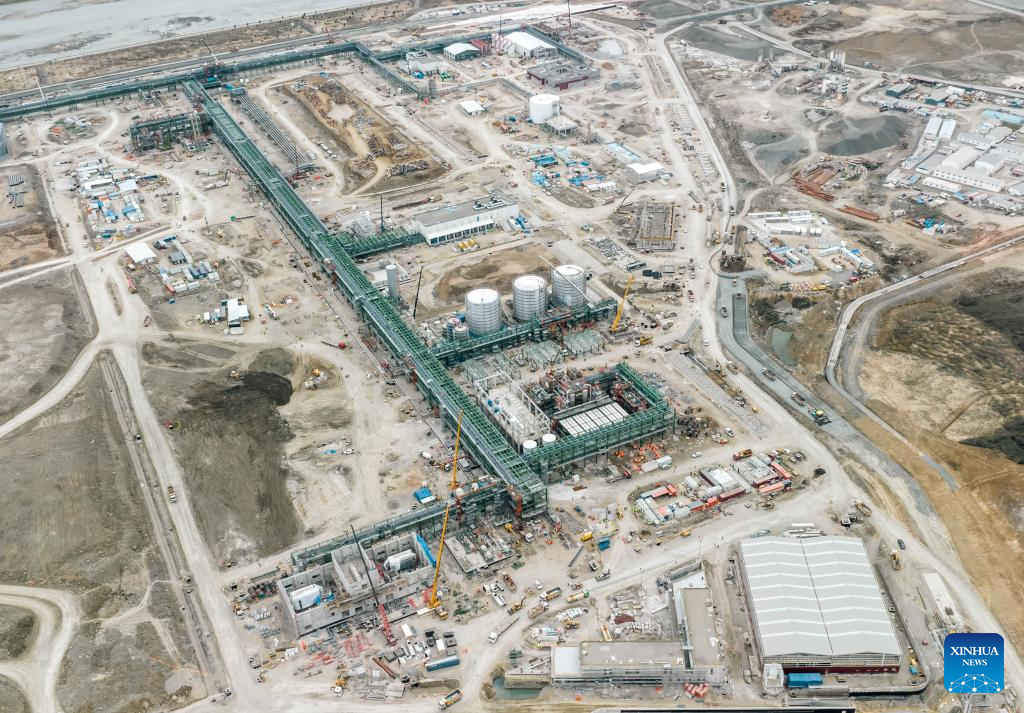
Photo taken on Feb. 20, 2024 shows the gas storage area in Zonguldak, northern Türkiye. Türkiye is seeking to attain energy independence in the upcoming 30 years with its newly found underground gas deposits and renewables, but this plan may be too ambitious, experts said. (Photo by Mustafa Kaya/Xinhua)
by Burak Akinci
ANKARA, Feb. 20 (Xinhua) -- Türkiye is seeking to attain energy independence in the upcoming 30 years with its newly found underground gas deposits and renewables, but this plan may be too ambitious, experts said.
Türkiye's President Recep Tayyip Erdogan said in a public speech on Feb. 10 in the northern Zonguldak province that the country's main goal is to attain "complete energy independence."
"Our main goal is to achieve complete independence in energy. We are determined and courageously implementing initiatives that will guarantee Türkiye's energy security," the Turkish leader said.
The import-reliant nation has made significant strides towards self-sufficiency in the last decade particularly, reducing its imports by investing in its own resources and renewables.
Located in a region with some of the world's richest oil and natural gas reserves, Türkiye has become one of the biggest natural gas and electricity markets in the Middle East, crossed by important pipelines, and seeks to be an energy hub.
On the other hand, Türkiye has a 68 percent import dependency, albeit down from over 70 percent in previous years, to meet its energy demand, Turkish Energy and Natural Resources Minister Alparslan Bayraktar said in December.
As part of its efforts to diversify its energy resources, the country has discovered 710 billion cubic meters of natural gas in the Black Sea and millions of barrels of oil in the southeastern Gabar region.
"As of today, we are extracting over 35,000 barrels per day in Gabar," Erdogan said in Zonguldak.
Türkiye is also speeding up efforts to extract shale gas from its soil.
However, those discoveries still fall short of the nation's growing energy demands, Ali Arif Akturk, an Ankara-based independent energy policies expert, told Xinhua in a recent interview.
"Türkiye is poor in energy resources. We don't have enough oil or natural gas. Yes, there have been some discoveries and enhancements in capacities in renewables, but these are limited," he said.
Even the much-hoped Russian-built nuclear plant Akkuyu could only meet 10 percent of Türkiye's electricity needs provided that all four of the plant's units were operational by 2028.
The 4800-MWE plant also sparks criticism that it could increase Türkiye's dependency on Russia for nuclear energy after gas imports.
Türkiye imported 45 percent of its gas consumption from Russia in 2021 and 40 percent in 2022.
In Türkiye's energy mix, gas share grew from 16 percent of the total energy consumption in 2000 to more than 30 percent in 2022, making the nation one of the biggest gas consumers in the world.
In the meantime, the share of renewables, such as solar, wind and geothermal, though also increased, was still not enough for Türkiye to achieve self-reliance, Akturk said. ■

Photo taken on Feb. 20, 2024 shows the gas storage area in Zonguldak, northern Türkiye. Türkiye is seeking to attain energy independence in the upcoming 30 years with its newly found underground gas deposits and renewables, but this plan may be too ambitious, experts said. (Photo by Mustafa Kaya/Xinhua)



